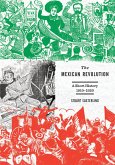- Broschiertes Buch
- Merkliste
- Auf die Merkliste
- Bewerten Bewerten
- Teilen
- Produkt teilen
- Produkterinnerung
- Produkterinnerung
A sweeping, insightful history from below of the Bolivarian Revolution and its efforts to build socialism in the 21st century.
Andere Kunden interessierten sich auch für
![Crafting Civilian Control of the Military in Venezuela Crafting Civilian Control of the Military in Venezuela]() Harold A. TrinkunasCrafting Civilian Control of the Military in Venezuela49,99 €
Harold A. TrinkunasCrafting Civilian Control of the Military in Venezuela49,99 €![The Dialectic of Position and Maneuver The Dialectic of Position and Maneuver]() Daniel EganThe Dialectic of Position and Maneuver29,99 €
Daniel EganThe Dialectic of Position and Maneuver29,99 €![The Revolutionary Marxism of Antonio Gramsci The Revolutionary Marxism of Antonio Gramsci]() Frank RosengartenThe Revolutionary Marxism of Antonio Gramsci35,99 €
Frank RosengartenThe Revolutionary Marxism of Antonio Gramsci35,99 €![What Went Wrong? the Nicaraguan Revolution What Went Wrong? the Nicaraguan Revolution]() Dan La BotzWhat Went Wrong? the Nicaraguan Revolution41,99 €
Dan La BotzWhat Went Wrong? the Nicaraguan Revolution41,99 €![Tramps and Trade Union Travelers Tramps and Trade Union Travelers]() Kim MoodyTramps and Trade Union Travelers19,99 €
Kim MoodyTramps and Trade Union Travelers19,99 €![Socialism: The Real History from Plato to the Present: How the Deep State Capitalizes on Crises to Consolidate Control [With Paperback Book] Socialism: The Real History from Plato to the Present: How the Deep State Capitalizes on Crises to Consolidate Control [With Paperback Book]]() William J. FedererSocialism: The Real History from Plato to the Present: How the Deep State Capitalizes on Crises to Consolidate Control [With Paperback Book]18,99 €
William J. FedererSocialism: The Real History from Plato to the Present: How the Deep State Capitalizes on Crises to Consolidate Control [With Paperback Book]18,99 €![The Mexican Revolution The Mexican Revolution]() Stuart EasterlingThe Mexican Revolution18,99 €
Stuart EasterlingThe Mexican Revolution18,99 €-
-
A sweeping, insightful history from below of the Bolivarian Revolution and its efforts to build socialism in the 21st century.
Hinweis: Dieser Artikel kann nur an eine deutsche Lieferadresse ausgeliefert werden.
Hinweis: Dieser Artikel kann nur an eine deutsche Lieferadresse ausgeliefert werden.
Produktdetails
- Produktdetails
- Verlag: Haymarket Books
- Seitenzahl: 316
- Erscheinungstermin: 20. Februar 2018
- Englisch
- Abmessung: 228mm x 151mm x 17mm
- Gewicht: 432g
- ISBN-13: 9781608468294
- ISBN-10: 1608468291
- Artikelnr.: 47748406
- Herstellerkennzeichnung
- Libri GmbH
- Europaallee 1
- 36244 Bad Hersfeld
- gpsr@libri.de
- Verlag: Haymarket Books
- Seitenzahl: 316
- Erscheinungstermin: 20. Februar 2018
- Englisch
- Abmessung: 228mm x 151mm x 17mm
- Gewicht: 432g
- ISBN-13: 9781608468294
- ISBN-10: 1608468291
- Artikelnr.: 47748406
- Herstellerkennzeichnung
- Libri GmbH
- Europaallee 1
- 36244 Bad Hersfeld
- gpsr@libri.de
Dario Azzellini (Ph.D. in Political Science, 2010, Goethe-Universität Frankfurt am Main, Germany; and Ph.D. Sociology, 2012, Benemérita Universidad Autónoma de Puebla, Mexico) is Assistant Professor of Sociology at the Johannes Kepler University Linz, Austria. He has published monographs, edited volumes, articles and documentaries on Latin America, workers' control and social movements, including An Alternative Labour History (Ed., Zed Books 2015) and They Can't Represent Us! (with Marina Sitrin, Verso, 2014).
Acknowledgements
Abbreviations
1. Introduction
1.1 Venezuela's specific path
1.2 The dilemma of the state
1.3 Two-track construction
1.4 Local self-government, communal councils (CCs), and communes
1.5 Cooperatives, co-management, self-management, and workers' control
1.6 The revolution without Chávez
2. Class, Constituent Power, and Popular Power
2.1 Updating the concept of class
Theoretical notes on class and multitude
Class composition and breadth in Venezuela
2.2 Socio-territorial segregation and class formation
2.3 From taking power to process: Constituent power and popular power
Crisis as a motor of history: Constituent power vs. constituted power
The popular constituent process
The simultaneity of foci: Resistance, insurrection and constituent power
Popular power: The knowledge of resistance
3. Movements and Alternative Construction in Venezuela
3.1 Social movements or popular movements?
3.2 The historical current for change and the ruptures of the continuum
3.3 The new framework of action
3.4 Popular actors and autonomous construction
The Bolívar and Zamora Revolutionary Current
The Settlers' Movement
National Network of Communards
4. The Communal Councils: Local Self-Administration and Social
Transformation
4.1 Participatory budgeting
The failed CLPP initiative
Metropolitan Council for Planning Public Policies (CMPPP)
The Municipal Constituent
The Local Work Cabinets in Caracas
4.2 The communal councils
The genesis of the CCs
Makeup and structure
Rigid law and flexible praxis
Financing and financial administration
Projects
Decentralisation or centralisation
Development, situation, and contradictions
Relationship between CCs and institutions
CCs and popular movements
Relations between CCs and communities
The appropriation of CCs by communities and the question of the state
4.3 The CCs as a means of participation in the barrios of Caracas
The 'Emiliano Hernández' Communal Council, Magallanes de Catia, Caracas
The CC as a body of self-administration
Participation as a process of development and of social recognition
Participation as a process of democratisation and of building collectivity
The CC 'Unidos por el Chapulún', Parroquia Nuestra Sra. del Rosario, Baruta
CCs in Caracas: Conclusions
Participation
Relationship between communities and institutions
5. New Collective Business Paradigms
5.1 Cooperatives
Roots of cooperativism in Venezuela
Governmental policies of support for cooperatives
Limitations of state support for cooperatives
Internal organisation of cooperatives
The problematisation of cooperativism
5.2 New entrepreneurial models
Private enterprise and co-management
Co-management in state businesses
Social Production Companies
6. Workers' Control, Workers' Councils, and Class Struggle
6.1 Recuperated companies and nationalisation
6.2 Workers' control and workers' councils
The movement for workers' control
The Socialist Workers' Councils
The CVG and the 2009-19 Socialist Guayana Plan
6.3 Workers' control: The example of Inveval
From the struggle for pay to the struggle for the factory
The workers abandon the cooperative and form a council
6.4 Alcasa: Class struggle for productive transformation against
bureaucracy and corruption
Revolutionary co-management
The victory of bureaucracy and corruption
Workers' control returns
The organisational structure of the new Alcasa
Worker inventiveness workshops
The Alcasa initiatives and the institutional embargo
The attack on workers' control and the negation of the Socialist Guayana
Plan
6.5 New struggles for workers' control
6.6 Approaching the issue of new worker subjectivities in the context of
participation and class struggle
Horizontality in the factory and change throughout society
The new collective self
7. Communes, Production, and the Communal State
7.1. Communes
Origin and form
Communes and constituted power
7.2 Companies of Communal Social Property and the construction of a
communal economy
7.3 Communal state: State or non-state?
8 Local and Worker Co-Management, Two-Track Construction, and Class
Struggle: A Preliminary Assessment
8.1 The Bolivarian process and class struggle
8.2 Communal councils, communes, and communal state
8.3 Property models, the administration of the means of production, and
class struggle
8.4 Nationalisation, workers' control, and the Socialist Workers' Councils
8.5 The relation of constituent and constituted power to class struggle
Interviews
References
Index
Abbreviations
1. Introduction
1.1 Venezuela's specific path
1.2 The dilemma of the state
1.3 Two-track construction
1.4 Local self-government, communal councils (CCs), and communes
1.5 Cooperatives, co-management, self-management, and workers' control
1.6 The revolution without Chávez
2. Class, Constituent Power, and Popular Power
2.1 Updating the concept of class
Theoretical notes on class and multitude
Class composition and breadth in Venezuela
2.2 Socio-territorial segregation and class formation
2.3 From taking power to process: Constituent power and popular power
Crisis as a motor of history: Constituent power vs. constituted power
The popular constituent process
The simultaneity of foci: Resistance, insurrection and constituent power
Popular power: The knowledge of resistance
3. Movements and Alternative Construction in Venezuela
3.1 Social movements or popular movements?
3.2 The historical current for change and the ruptures of the continuum
3.3 The new framework of action
3.4 Popular actors and autonomous construction
The Bolívar and Zamora Revolutionary Current
The Settlers' Movement
National Network of Communards
4. The Communal Councils: Local Self-Administration and Social
Transformation
4.1 Participatory budgeting
The failed CLPP initiative
Metropolitan Council for Planning Public Policies (CMPPP)
The Municipal Constituent
The Local Work Cabinets in Caracas
4.2 The communal councils
The genesis of the CCs
Makeup and structure
Rigid law and flexible praxis
Financing and financial administration
Projects
Decentralisation or centralisation
Development, situation, and contradictions
Relationship between CCs and institutions
CCs and popular movements
Relations between CCs and communities
The appropriation of CCs by communities and the question of the state
4.3 The CCs as a means of participation in the barrios of Caracas
The 'Emiliano Hernández' Communal Council, Magallanes de Catia, Caracas
The CC as a body of self-administration
Participation as a process of development and of social recognition
Participation as a process of democratisation and of building collectivity
The CC 'Unidos por el Chapulún', Parroquia Nuestra Sra. del Rosario, Baruta
CCs in Caracas: Conclusions
Participation
Relationship between communities and institutions
5. New Collective Business Paradigms
5.1 Cooperatives
Roots of cooperativism in Venezuela
Governmental policies of support for cooperatives
Limitations of state support for cooperatives
Internal organisation of cooperatives
The problematisation of cooperativism
5.2 New entrepreneurial models
Private enterprise and co-management
Co-management in state businesses
Social Production Companies
6. Workers' Control, Workers' Councils, and Class Struggle
6.1 Recuperated companies and nationalisation
6.2 Workers' control and workers' councils
The movement for workers' control
The Socialist Workers' Councils
The CVG and the 2009-19 Socialist Guayana Plan
6.3 Workers' control: The example of Inveval
From the struggle for pay to the struggle for the factory
The workers abandon the cooperative and form a council
6.4 Alcasa: Class struggle for productive transformation against
bureaucracy and corruption
Revolutionary co-management
The victory of bureaucracy and corruption
Workers' control returns
The organisational structure of the new Alcasa
Worker inventiveness workshops
The Alcasa initiatives and the institutional embargo
The attack on workers' control and the negation of the Socialist Guayana
Plan
6.5 New struggles for workers' control
6.6 Approaching the issue of new worker subjectivities in the context of
participation and class struggle
Horizontality in the factory and change throughout society
The new collective self
7. Communes, Production, and the Communal State
7.1. Communes
Origin and form
Communes and constituted power
7.2 Companies of Communal Social Property and the construction of a
communal economy
7.3 Communal state: State or non-state?
8 Local and Worker Co-Management, Two-Track Construction, and Class
Struggle: A Preliminary Assessment
8.1 The Bolivarian process and class struggle
8.2 Communal councils, communes, and communal state
8.3 Property models, the administration of the means of production, and
class struggle
8.4 Nationalisation, workers' control, and the Socialist Workers' Councils
8.5 The relation of constituent and constituted power to class struggle
Interviews
References
Index
Acknowledgements
Abbreviations
1. Introduction
1.1 Venezuela's specific path
1.2 The dilemma of the state
1.3 Two-track construction
1.4 Local self-government, communal councils (CCs), and communes
1.5 Cooperatives, co-management, self-management, and workers' control
1.6 The revolution without Chávez
2. Class, Constituent Power, and Popular Power
2.1 Updating the concept of class
Theoretical notes on class and multitude
Class composition and breadth in Venezuela
2.2 Socio-territorial segregation and class formation
2.3 From taking power to process: Constituent power and popular power
Crisis as a motor of history: Constituent power vs. constituted power
The popular constituent process
The simultaneity of foci: Resistance, insurrection and constituent power
Popular power: The knowledge of resistance
3. Movements and Alternative Construction in Venezuela
3.1 Social movements or popular movements?
3.2 The historical current for change and the ruptures of the continuum
3.3 The new framework of action
3.4 Popular actors and autonomous construction
The Bolívar and Zamora Revolutionary Current
The Settlers' Movement
National Network of Communards
4. The Communal Councils: Local Self-Administration and Social
Transformation
4.1 Participatory budgeting
The failed CLPP initiative
Metropolitan Council for Planning Public Policies (CMPPP)
The Municipal Constituent
The Local Work Cabinets in Caracas
4.2 The communal councils
The genesis of the CCs
Makeup and structure
Rigid law and flexible praxis
Financing and financial administration
Projects
Decentralisation or centralisation
Development, situation, and contradictions
Relationship between CCs and institutions
CCs and popular movements
Relations between CCs and communities
The appropriation of CCs by communities and the question of the state
4.3 The CCs as a means of participation in the barrios of Caracas
The 'Emiliano Hernández' Communal Council, Magallanes de Catia, Caracas
The CC as a body of self-administration
Participation as a process of development and of social recognition
Participation as a process of democratisation and of building collectivity
The CC 'Unidos por el Chapulún', Parroquia Nuestra Sra. del Rosario, Baruta
CCs in Caracas: Conclusions
Participation
Relationship between communities and institutions
5. New Collective Business Paradigms
5.1 Cooperatives
Roots of cooperativism in Venezuela
Governmental policies of support for cooperatives
Limitations of state support for cooperatives
Internal organisation of cooperatives
The problematisation of cooperativism
5.2 New entrepreneurial models
Private enterprise and co-management
Co-management in state businesses
Social Production Companies
6. Workers' Control, Workers' Councils, and Class Struggle
6.1 Recuperated companies and nationalisation
6.2 Workers' control and workers' councils
The movement for workers' control
The Socialist Workers' Councils
The CVG and the 2009-19 Socialist Guayana Plan
6.3 Workers' control: The example of Inveval
From the struggle for pay to the struggle for the factory
The workers abandon the cooperative and form a council
6.4 Alcasa: Class struggle for productive transformation against
bureaucracy and corruption
Revolutionary co-management
The victory of bureaucracy and corruption
Workers' control returns
The organisational structure of the new Alcasa
Worker inventiveness workshops
The Alcasa initiatives and the institutional embargo
The attack on workers' control and the negation of the Socialist Guayana
Plan
6.5 New struggles for workers' control
6.6 Approaching the issue of new worker subjectivities in the context of
participation and class struggle
Horizontality in the factory and change throughout society
The new collective self
7. Communes, Production, and the Communal State
7.1. Communes
Origin and form
Communes and constituted power
7.2 Companies of Communal Social Property and the construction of a
communal economy
7.3 Communal state: State or non-state?
8 Local and Worker Co-Management, Two-Track Construction, and Class
Struggle: A Preliminary Assessment
8.1 The Bolivarian process and class struggle
8.2 Communal councils, communes, and communal state
8.3 Property models, the administration of the means of production, and
class struggle
8.4 Nationalisation, workers' control, and the Socialist Workers' Councils
8.5 The relation of constituent and constituted power to class struggle
Interviews
References
Index
Abbreviations
1. Introduction
1.1 Venezuela's specific path
1.2 The dilemma of the state
1.3 Two-track construction
1.4 Local self-government, communal councils (CCs), and communes
1.5 Cooperatives, co-management, self-management, and workers' control
1.6 The revolution without Chávez
2. Class, Constituent Power, and Popular Power
2.1 Updating the concept of class
Theoretical notes on class and multitude
Class composition and breadth in Venezuela
2.2 Socio-territorial segregation and class formation
2.3 From taking power to process: Constituent power and popular power
Crisis as a motor of history: Constituent power vs. constituted power
The popular constituent process
The simultaneity of foci: Resistance, insurrection and constituent power
Popular power: The knowledge of resistance
3. Movements and Alternative Construction in Venezuela
3.1 Social movements or popular movements?
3.2 The historical current for change and the ruptures of the continuum
3.3 The new framework of action
3.4 Popular actors and autonomous construction
The Bolívar and Zamora Revolutionary Current
The Settlers' Movement
National Network of Communards
4. The Communal Councils: Local Self-Administration and Social
Transformation
4.1 Participatory budgeting
The failed CLPP initiative
Metropolitan Council for Planning Public Policies (CMPPP)
The Municipal Constituent
The Local Work Cabinets in Caracas
4.2 The communal councils
The genesis of the CCs
Makeup and structure
Rigid law and flexible praxis
Financing and financial administration
Projects
Decentralisation or centralisation
Development, situation, and contradictions
Relationship between CCs and institutions
CCs and popular movements
Relations between CCs and communities
The appropriation of CCs by communities and the question of the state
4.3 The CCs as a means of participation in the barrios of Caracas
The 'Emiliano Hernández' Communal Council, Magallanes de Catia, Caracas
The CC as a body of self-administration
Participation as a process of development and of social recognition
Participation as a process of democratisation and of building collectivity
The CC 'Unidos por el Chapulún', Parroquia Nuestra Sra. del Rosario, Baruta
CCs in Caracas: Conclusions
Participation
Relationship between communities and institutions
5. New Collective Business Paradigms
5.1 Cooperatives
Roots of cooperativism in Venezuela
Governmental policies of support for cooperatives
Limitations of state support for cooperatives
Internal organisation of cooperatives
The problematisation of cooperativism
5.2 New entrepreneurial models
Private enterprise and co-management
Co-management in state businesses
Social Production Companies
6. Workers' Control, Workers' Councils, and Class Struggle
6.1 Recuperated companies and nationalisation
6.2 Workers' control and workers' councils
The movement for workers' control
The Socialist Workers' Councils
The CVG and the 2009-19 Socialist Guayana Plan
6.3 Workers' control: The example of Inveval
From the struggle for pay to the struggle for the factory
The workers abandon the cooperative and form a council
6.4 Alcasa: Class struggle for productive transformation against
bureaucracy and corruption
Revolutionary co-management
The victory of bureaucracy and corruption
Workers' control returns
The organisational structure of the new Alcasa
Worker inventiveness workshops
The Alcasa initiatives and the institutional embargo
The attack on workers' control and the negation of the Socialist Guayana
Plan
6.5 New struggles for workers' control
6.6 Approaching the issue of new worker subjectivities in the context of
participation and class struggle
Horizontality in the factory and change throughout society
The new collective self
7. Communes, Production, and the Communal State
7.1. Communes
Origin and form
Communes and constituted power
7.2 Companies of Communal Social Property and the construction of a
communal economy
7.3 Communal state: State or non-state?
8 Local and Worker Co-Management, Two-Track Construction, and Class
Struggle: A Preliminary Assessment
8.1 The Bolivarian process and class struggle
8.2 Communal councils, communes, and communal state
8.3 Property models, the administration of the means of production, and
class struggle
8.4 Nationalisation, workers' control, and the Socialist Workers' Councils
8.5 The relation of constituent and constituted power to class struggle
Interviews
References
Index

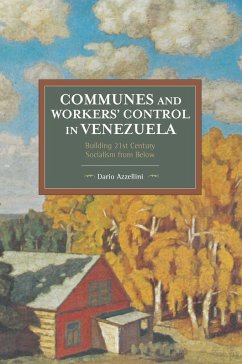
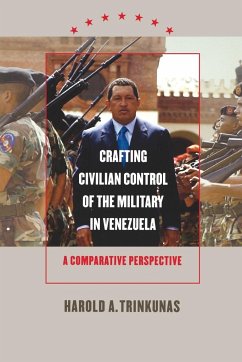


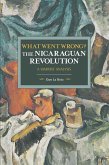
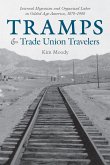
![Socialism: The Real History from Plato to the Present: How the Deep State Capitalizes on Crises to Consolidate Control [With Paperback Book] Socialism: The Real History from Plato to the Present: How the Deep State Capitalizes on Crises to Consolidate Control [With Paperback Book]](https://bilder.buecher.de/produkte/59/59962/59962980m.jpg)
